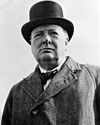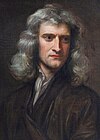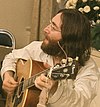100 Greatest Britons
100 Greatest Britons was broadcast in 2002 by the BBC. The programme was based on a television poll conducted to determine whom the United Kingdom public considered the greatest British people in history.[1][2] The series, Great Britons, included individual programmes featuring the individuals who featured in the top ten, with viewers having further opportunities to vote after each programme.[3] It concluded with a debate. All of the top 10 were dead by the year of broadcast.
The poll resulted in nominees including Guy Fawkes, who was executed for trying to blow up the Parliament of England; Oliver Cromwell, who created a republican England; Richard III, suspected of murdering his nephews; James Connolly, an Irish nationalist and socialist who was executed by the Crown in 1916; and a surprisingly high ranking of 17th for actor and singer Michael Crawford (the second highest-ranked entertainer, after John Lennon). Diana, Princess of Wales was judged to be a greater historical British figure than William Shakespeare by BBC respondents to the survey.
One of the more controversial figures to be included on the list was occultist Aleister Crowley. His works had a direct influence on the rise in popular occultism and some forms of neopaganism in the 20th century. In addition to the Britons, some notable non-British entrants were listed, including two Irish nationals, the philanthropic musicians Bono and Bob Geldof. The top 19 entries were people of English origin (though Sir Ernest Shackleton and Arthur Wellesley, 1st Duke of Wellington, were both born into Anglo-Irish families when what is now the Republic of Ireland was part of the United Kingdom). The highest-placed Scottish entry was Alexander Fleming in 20th place, with the highest Welsh entry, Owain Glyndŵr, at number 23.[4] Sixty had lived in the 20th century. The highest-ranked living person was Margaret Thatcher, placed 16th.[5] Ringo Starr is the only member of The Beatles not on the list. Isambard Kingdom Brunel occupied the top spot in the polls for some time thanks largely to "students from Brunel University who have been campaigning vigorously for the engineer for weeks."[6] However, a late surge in the final week of voting put Churchill over the top.[6] Of the top 100, 13 are women.
The opening and closing ceremonies of the 2012 Summer Olympics featured the two greatest Britons, Isambard Kingdom Brunel and Winston Churchill as main characters, played by Kenneth Branagh and Timothy Spall, each of them reading a monologue from William Shakespeare's The Tempest.[7][8] The ceremony also included a personal appearance by Tim Berners-Lee,[9] who was placed 99th on the list. There were no black Britons on the list, prompting a separate three-month survey to find the 100 greatest black Britons.[10][11]
Top 10 on the list
Due to the nature of the poll used to select and rank the Britons, the results do not claim to be an objective assessment. They are as follows:
| Rank | Name | Notability | Nomination defended by | Ref. | |
|---|---|---|---|---|---|
| 1 | Sir Winston Churchill | 
|
Prime Minister (1940–1945, 1951–1955). Historically ranked as one of the greatest British prime ministers. Kept the nation's spirit up during World War II, when the country had to defend itself against Hitler's attempts to invade. He was an important figure in post-war international and national politics as well. Received the Nobel Prize in Literature in 1953. | Mo Mowlam, British politician.[12] | [13] |
| 2 | Isambard Kingdom Brunel | 
|
Designer of the Great Western Railway, Clifton Suspension Bridge, SS Great Britain and numerous significant ships, tunnels and bridges. A prominent figure during the Industrial Revolution which began in Britain, he revolutionised public transport and modern engineering.[14] | Jeremy Clarkson, TV presenter.[12] | [13] |
| 3 | Diana, Princess of Wales | 
|
First wife of Charles, Prince of Wales (marriage 1981–1996), and mother of Prince William, Duke of Cambridge, and Prince Harry. Admired for her philanthropic deeds. | Rosie Boycott, journalist and feminist activist.[12] | [13] |
| 4 | Charles Darwin | 
|
Biologist. Originator of the theory of evolution through natural selection and author of On the Origin of Species. | Andrew Marr, journalist and TV presenter.[12] | [13] |
| 5 | William Shakespeare | 
|
Poet and playwright. Creator of Hamlet, Macbeth, Romeo and Juliet, and many more. Thought of by many as the greatest of all English writers. He is still an internationally admired and influential figure in the field of theatre. | Fiona Shaw, actress and theatre and opera director.[12] | [13] |
| 6 | Sir Isaac Newton | 
|
Physicist, mathematician, astronomer, natural philosopher. Originator of universal gravitation and laws of classical mechanics and laws of motion. His Principia is one of the most influential works in the history of science. | Tristram Hunt, historian.[12] | [13] |
| 7 | Queen Elizabeth I | 
|
Queen (1558–1603). Brought a period of relative internal stability. She is associated with the defeat of the Spanish Armada. Her reign is known as the Elizabethan era. | Michael Portillo, journalist and politician.[12] | [13] |
| 8 | John Lennon | 
|
Pop/rock singer and member of The Beatles. One of the most famous, successful, influential, covered and admired pop artists of all time. Hailed for his peace activism. | Alan Davies, comedian and actor.[12] | [13] |
| 9 | Vice-Admiral Horatio Nelson, 1st Viscount Nelson | 
|
Naval commander, famous for his service in the Royal Navy, particularly during the Napoleonic Wars. His victory during the Battle of Trafalgar was significant in preventing an invasion by Napoleon Bonaparte's army. | Lucy Moore, historian.[12] | [13] |
| 10 | Oliver Cromwell | 
|
1st Lord Protector of the Commonwealth of England, Scotland and Ireland (1653–1658). Commander of the New Model Army during the English Civil War against King Charles I. Admired for moving the country to a more democratic stateform, though his nomination was controversial due to allegations of genocide in Ireland. | Richard Holmes, military historian.[12] | [13] |
Full list
Although the BBC's original ranked list has been removed from their web server and what remains is only an alphabetical list of the Top 100,[15] several other sources[16][17][18] have preserved the original ranked list.
There was some question as to whether the Richard Burton listed at #96 is the actor or the explorer. A BBC press release makes it clear that they intended it to be the actor.
See also
References
- ^ 100 great British heroes—BBC News article, dated Wednesday, 21 August 2002 (contains the top 100, sorted alphabetically)
- ^ BBC reveals 100 great British heroes—BBC News article, dated Thursday, 22 August 2002
- ^ Ten greatest Britons chosen—BBC News article, dated Sunday, 20 October 2002
- ^ Rebel 'plot' to topple greatest Welshman The Independent. Retrieved 26 September 2011
- ^ Three lead race to be greatest Briton The Times. Retrieved 26 September 2011
- ^ a b "Churchill leads great Britons poll". Daily Mail. Retrieved 13 March 2013
- ^ "Brunel reads from Shakespeare's The Tempest". ITV News. Retrieved 24 August
- ^ "Timothy Spall plays Churchill at closing ceremony". BBC News. Retrieved 24 August
- ^ "Web inventor Tim Berners-Lee stars in Olympics opening ceremony" ZDNet. Retrieved 10 April 2013
- ^ "Nurse named greatest black Briton". BBC News. 10 February 2004. Retrieved 23 March 2015.
- ^ Solambey F. "The 100 greatest Black Britons". Afrokanlife. Archived from the original on 30 March 2015. Retrieved 27 March 2015.
{{cite web}}: Unknown parameter|deadurl=ignored (|url-status=suggested) (help) - ^ a b c d e f g h i j "BBC TWO reveals the ten greatest Britons of all time". BBC. Retrieved 11 October 2015
- ^ a b c d e f g h i j "Great Britons". BBC History. Retrieved 11 October 2015
- ^ "Why the Industrial Revolution Happened Here". BBC. 10 July 2017.
- ^ BBC - Press Office - List of top 100 Britons, BBC Press Release, 8 August 2002
- ^ 100 Greatest Britons (BBC Poll, 2002) - Alchemipedia, posted 8 December 2009
- ^ "Great Britons 1-10". BBC via Wayback Machine. Archived from the original on 4 February 2004. Retrieved 1 August 2012.
- ^ "Great Britons 11-100". BBC via Wayback Machine. Archived from the original on 4 December 2002. Retrieved 1 August 2012.
